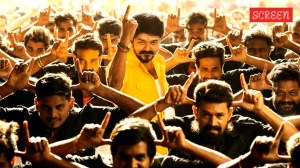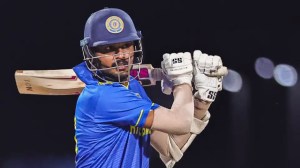The Sound and The Fury
The man who changed Bengali music forever is now a legislator. Kabir Suman,Member of Parliament and Kolkatas most dogged rebel,looks back on a political life
The man who changed Bengali music forever is now a legislator. Kabir Suman,Member of Parliament and Kolkatas most dogged rebel,looks back on a political life
A storm is raging in Kolkata. The wind whips windows and snaps old branches off trees. Rain falls in blinding curtains,driven by the mad drum roll of thunder. In a dimly-lit room,on a square of a rug,sits the man who whipped up another kind of storm in Bengals life in the 1990s,with a guitar and a song: Kabir Suman,songwriter-musician,journalist and author,and now Member of Parliament from Jadavpur Lok Sabha constituency.
At 61,his frame is a little bent with age,his hand trembles as he lifts the cellphone to his ears. But the eyes look steadily at you and the voice is still rich with vigour as he takes you back to that time in 1985,when as a broadcast journalist in America,he travelled to Nicaragua to see what revolution looked like. The Sandinista Liberation Front had just overthrown the dictatorship in the Central American country and Suman was among the handful of journalists in the combat zone. Unlike in a war,a journalist has to be trained to survive a combat zone where guerrilla warfare is on because you dont know who your enemy is or your friend, he says with a puff on his cigarette. As part of the training,Suman and another journalist were asked to cross a field riddled with mines. Campaneiro,go cross the field. Good luck, was all they said to us. I pissed six times in my pants,so did my friend. We hugged each other and walked. Death and us,never closer. But it drove the fear out of me, he says thoughtfully.
You could say,Suman has lived through interesting timesand survived the curse. Or as he puts it,while his beady eyes laugh at such a suggestion,I have never,you see,been a weak man. Anyone who has seen me perform on stage would have known that. They CPI-M should have known that I wasnt going to stay at home,singing beautiful songs when I stood for election. They should have known they had a fight on their hands, he says.
Anyone who saw Suman perform on stage in the early 1990s had never seen or heard anything like that before. He was Suman Chatterjee then,a bearded,balding man in his 40s,in jeans and a shirt,guitar strapped on his shoulder,the harmonica hanging from his neck and the keyboard in front of him,playing,singing and performingone man against the darkness of the stage,changing forever the tradition of Bangla Adhunik Gaan Bengali modern music,at the time,anything but modern and stuck in an awful rut. He was a phenomenon, says S.F. Karim,chief manager,content,Saregama,who was associated with the release of Sumans first album Tomake Chai in 1992. He brought about a renaissance in Bengali music. There had been no one like him before. He brought a new sound,and most importantly,good poetry. His music doesnt fall into any category; its a niche of its ownSumaner gaan Sumans music.
Since a child,music was the mesh of Sumans life,the future that had been decided for him. My father Sudhindra Nath Chatterjee was an eminent singer,so was my mother. I got a rigorous training in Indian classical music from the age of eight. By 14,I was being trained in the great classical tradition of khayal. When I was 17,I became a regular singer at AIR stations. Everything in my life was pushing me towards becoming a professional vocalist. Music was all I had. I was also bound by music, he says.
And yet,in 1973,two records of Rabindrasangeet under his belt,he stopped singing. He had heard Bob Dylan in France. It was at a friends house and I had never heard Dylan before. I heard a nasal voice singing Oh,where have you been,my blue-eyed son? And I thought,this man has done it,he has shown me the way, he says. For what had been festering inside Suman was the awareness that his music,his khayal,wasnt speaking to his time and his life. And they were turbulent times,of the Naxalbari uprising and the decline of the Congress influence. Of days when I would go to office and find young men,dead,floating in the nearby canal. Of friends who I had tea with one evening and who were shot dead in encounters the next, he says.
In France,he attended a meeting where Jean Paul-Sartre,who had just turned Maoist,distributed pamphlets. You see,I was a man of those times and yet my music wasnt. Nothing in that music,those lyrics answered to my life. They were not in the language in which I loved and lusted,the way I conversed with my Gandhian father about Marx,the way the people around me lived. When I heard Dylan I knew that I had to write my own songs, says Suman. He came back to Kolkata and told his recording company that hed sing no more. So you see,its not that I have plunged into politics now. That time politicised me. That awareness politicised me. Ustad Amir Khan telling me that I had to think about my music,that politicised me, he says,voice rising to the clap of thunder outside.
But it was only in the early 1990s that he became a public performer,his music and ideas brewing inside him for the 14 years that he spent outside the country as a broadcast journalist,when he came into contact with such personalities as Maya Angelou and Pete Seeger,experimented with genres such as the New Song of Latin America and instrumentshe started learning classical guitar at the age of 37.
Tomake Chai with albums like Ichhe Hole,Gaanola,Jatismar shook up Bengali music. Out went the soppy indulgence of romantic lyrics,and a new idiom was born. A poetry forged from contemporary language,that tapped into folk music and Western protest songs,that spoke about chena dukkho,chena shukh/chena alo,chena ondhokar these familiar sorrows,these old joys/ this light and this familiar darkness,about the daily fire of ordinary lives. His songs were a powerful,often political,expression of the here and now. They were called the jibonmukhi gaansongs of lifeand they inspired a generation of musicians. He brought intelligence to Bengali popular music. His lyrics raised it to the level of literature, says Anjan Dutt,one of many singers who followed in Sumans steps.
Suman was the nagorik kobyal,the urban poet,and his muse was Kolkata,in all its filth and beauty. In the madman left to decay on its streets he saw the tragedy of one man,playing shaanp-ludo with the gods. He was lyrically inventive,making songs out of the daily mishaps of Kolkatas crumbling civic life: Papri De,a song about a girl who swallowed a pen cap and died of medical neglect. In his songs,the city is both a place of death morar desh and a place where the hope of change is born with every sunrise: Proti din shurjo othe tomay dekhbe bole/Hey amar agun tumi abar otho jole Every day,the sun rises to see you,beloved/O my fire,burn again in my life.
Revolution has been the promise of Sumans music,the dawn at the end of the song: Haal chhero na bondhu,borong kontho chharo dure/Dekha hobe tomar amar onnyo gaaner bhore Don8217;t lose heart,my friend,instead/Loosen your voice,loud and strong/We will meet,you and I,/At the dawn of another song!. But if his voice can raise the tumult of change,it can whisper too with the tenderness of love and Suman has written some of the best love songs,fusing desire with revolution: Bidroho ebong chumur dibbi,shudhu tomake chai I swear on your kisses and the revolution/All I want is you.
His early concerts were dramatic and aggressiveand uncompromising in their criticism of the establishment. He didnt just sing,he laughed and raged,cajoled and joked,swore and ranted. He was everything the bhadralok wasnthe was passion in flesh and bloodbut he gave voice to their angst. He kept the choicest abuses for the police and the government and even turned journalists out of his concerts. The CPM and he,they go back a long way,to the time he turned against the Left during the 90s Kanoria jute workers agitation. He has been a dogged nonconformist since in a state that thrives on the red writ. I abused them. They too didn8217;t stop from turning every establishment against methe press,the police,the government, he says. His support and advocacy of the peasants in Singur and Nandigram was a natural progression.
But after a long stretch of popularity,Sumans stock began to fall in the early 2000s. The quality of his music declined. He was a temperamental man and stories of his crankiness abound in the industry. His messy divorce with his first wife Maria,a German,and rumours of domestic violence didnt go down well with the people. Neither did his conversion to Islam in 2000 and his subsequent marriage with Bangladeshi singer Sabeena Yasmin. The fact is Bengalis are communal people despite the veneer of being liberal, says Suman Chattopadhya of the label Cosmik Harmony that brought out his last few albums. A Brahmins son converting to Islam wasnt acceptable. And his trenchant political stance had alienated people too. But Suman was perhaps also the rebel the middle-class morality couldn8217;t stomach for too long. All that people have been interested in is how many women I have slept with. The CPM made a campaign out of targetting my sexual life. I hope they found pleasure in it,8221; says Suman,bitter about the vilification he faced.
As an MP,Suman is eager to learn Hindi and has already picked up a beginners guide. I want to watch,absorb,and learn what goes on in Parliament. Im not here to be a politician. I am happy with one term only. All I want is development for my people, he says. Suman rues that politics will take away his silence and the time he spends with his music,with Ustad Amir Khan and Nikhil Banerjee. But yes,I have lived a good life. I still have love,lust and my sense of humour, he says. Like that Leonard Cohen number. He picks up his guitar and sings: Like a bird on the wire/Like a drunk in a midnight choir/I have tried in my way to be free.
Photos
- 01
- 02
- 03
- 04
- 05































